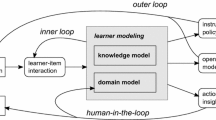Abstract
We present a framework for measurement and diagnosis using knowledge-based models. Based on formulations of knowledge-level analysis, symbol-level analysis, constructivist learning, and situated cognition, we describe the possible frames of reference and fundamental measurement approaches that may be adopted in the analysis of cognition and learning. In general, these frames of reference define how individuals, contexts, knowledge, and activity are constitutively defined. We then present several measurement models extending the objective measurement approach of Rasch models to the analysis of learning strategies and knowledge development. The structure and parameter estimates of such models can then be used in the specification of probabilistic belief networks that can perform on-line student modelling.
This research is supported by Office of Naval Research, Cognitive Science Program, grant no. N00014-91J-1523. We thank Michael Ranney and Margaret Recker for their comments.
Preview
Unable to display preview. Download preview PDF.
Similar content being viewed by others
References
R. J. Adams, M. Wilson: A random coefficients multinomial logit: A generalized approach to fitting Rasch models (under review), 1991a
R. J. Adams, M. Wilson: Hierarchical multinomial logistic regression. (in preparation), 1991b
E. B. Andersen: A general latent structure model for contingency table data. H. Wainer, S. Messick (Eds.), Principles of modern psychological measurement, Hillsdale, NJ: Lawrence Erlbaum, 1983
S. K. Andersen, K. G. Olesen, F. U. Jensen, F. Jensen: Hugin-A shell for building bayesian belief universes for expert systems. Proceedings of the Eleventh International Conference on Artificial Intelligence (pp. 1080–1085), Los Altos, CA: Morgan Kaufman, 1989
J. R. Anderson, C. F. Boyle, A. Corbett, M. W. Lewis: Cognitive modelling and intelligent tutoring. Artificial Intelligence 42 (p. 7–49), 1990
J. R. Anderson, F. G. Conrad, A. T. Corbett:. Skill acquisition and the LISP tutor. Cognitive Science 13 (pp. 467–505), 1989
D. Andrich: Rasch models for measurement. Beverly Hills, CA: SAGE Publications, 1988
R. D. Bock: Marginal maximum likelihood estimation of item parameters: Application of an EM algorithm. Psychometrika 46 (p. 431–444), 1981
M. T. H. Chi, M. Bassok, M. W. Lewis, P. Reiman, R. Glaser: Self-explanations: How students study and use examples in learning to solve problems. Cognitive Science 13 (p. 145–182), 1989
K. A. Ericsson, H. A. Simon: Protocol Analysis: Verbal reports as data. Cambridge, MA: MIT Press, 1984
J. J. Gibson: The ecological approach to visual perception. Boston: Houghton Mifflin, 1979
J. G. Greeno: Number sense as situated knowing in a conceptual domain. Journal for Research in Mathemetics Education 22 (pp. 170–218), 1991
H. Kelderman: Loglinear multidimensional IRT models for polytomously scored items. Paper presented at the Fifth International Objective Measurement Workshop, University of California, Berkeley, 1989
D. H. Krantz: Conjoint measurement: The Luce-Tukey axiomatization and some extensions. Journal of Mathematical Psychology 1 (pp. 248–277), 1964
R. D. Luce, J. W. Tukey:. Simultaneous conjoint measurement: A new type of fundamental measurement. Journal of Mathematical Psychology 1 (pp. 1–27), 1964
R. J. Mislevy, K. Yamamoto, S. Anacker: Toward a test theory for assessing student understanding. Princeton, NJ: Educational Testing Service, 1990
J. Moore, A. Newell: How can MERLIN understand? In L. Gregg (Ed.), Knowledge and cognition (pp. 201–252). Hillsdale, NJ: Lawrence Erlbaum, 1973
A. Newell: Unified theories of cognition. Cambridge, MA: Harvard University Press, 1990
A. Newell, H. A. Simon: Human problem solving. Englewood Cliffs, NJ: Prentice Hall, 1972
J. Pearl: Probabilistic reasoning in intelligent systems: Networks of plausible inference. Los Altos, CA: Morgan Kaufman, 1988
R. Perline, B. D. Wright, H. Wainer: The Rasch model as additive conjoint measurement. Applied Psychological Measurement 3 (pp. 237–255), 1979
P. Pirolli: Effects of examples and their explanations in a lesson on recursion: A production system analysis. Cognition and Instruction 8 (207–259), 1991
P. Pirolli, K. Bielaczyc: Empirical analyses of self-explanation and transfer in learning to program. Proceedings of the Annual Conference of the Cognitive Science Society (pp. 450–457). Hillsdale, NJ: Lawrence Erlbaum, 1989
P. Pirolli, M. Recken Knowledge construction and transfer using an intelligent tutoring system: The role of examples, self-explanation, practice, and reflection (Tech, Rep. No. CSM-1). University of California, 1991
G. Rasch: Probabilistic models for some intelligence and attainment tests. Copenhagen: Danish Institute for Educational Research, 1960
V. J. Shute, R. Glaser: Large-scale evaluation of an intelligent tutoring system: Smithtown. Interactive Learning Environments 1 (pp. 51–76), 1990
K. VanLehn: Student modelling. In M. C. Polson, J. J. Richardson (Ed.), Foundations of intelligent tutoring systems (pp. 479–530). Hillsdale, NJ: Lawrence Erlbaum, 1988
E. Wenger: Artificial intelligence and tutoring systems. Los Altos, CA: Morgan Kaufman, 1987
M. Wilson: An extension of the partial credit model to incorporate diagnostic information. Paper presented at the Annual Meeting of the National Council for Measurement in Education, Boston, MA, 1990
M. Wilson: To describe their performances well: Contributions to a new psychometrics. Paper presented at the Natinal Academy of Education Spencer Fellows Forum, Boston, MA, 1991
Author information
Authors and Affiliations
Editor information
Rights and permissions
Copyright information
© 1992 Springer-Verlag Berlin Heidelberg
About this paper
Cite this paper
Pirolli, P., Wilson, M. (1992). Measuring learning strategies and understanding: A research framework. In: Frasson, C., Gauthier, G., McCalla, G.I. (eds) Intelligent Tutoring Systems. ITS 1992. Lecture Notes in Computer Science, vol 608. Springer, Berlin, Heidelberg. https://doi.org/10.1007/3-540-55606-0_64
Download citation
DOI: https://doi.org/10.1007/3-540-55606-0_64
Published:
Publisher Name: Springer, Berlin, Heidelberg
Print ISBN: 978-3-540-55606-0
Online ISBN: 978-3-540-47254-4
eBook Packages: Springer Book Archive




